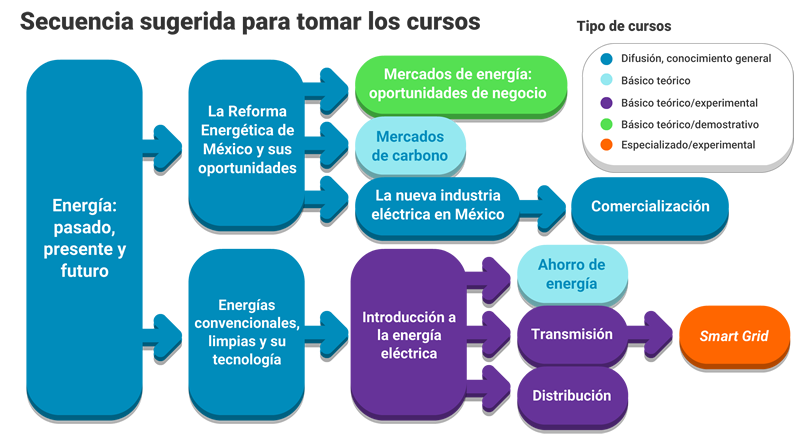Our economies are thirsty for energy. Without energy, world economy would simply stop; there would not be enough energy generation, fuel for automobiles, public transportation, ground transportation of merchandises through bus or train. We would not be able to move merchandises by sea, the food production would have problems, and the supply of drinkable water would be compromised.
Energy has allowed, since the end of the XVIII century, an unparalleled development in the scientific, technological, and economical fields of our society. We have been able to enjoy, up to this moment, a relatively cheap supply of energy through fossil fuels, generating with this a negative impact on the environment.
The selected path of consumption of fossil fuels we have followed up to now is not sustainable on the long run. This brings a challenge we cannot dodge, even if we may deny it: what should we do to achieve a future survival towards a low carbon economy with less dependence from fossil fuels and thus assure that future generations have the possibility to enjoy a better life quality?
We are in front of a turning point to change the way we use and appropriate the natural resources, as well as to work on decreasing poverty and social inequality.
This course will allow you to delve into the fascinating world of energy. The contents of the course provides you with tools for interpretation and handling of basic information about energy, as well as knowledge of the historical changes linked with energy that have been fundamental in the development of modern society. The contents of the course will help you with the solution of questions such as, has energy always been a factor of change in the development of society? Will the era of oil end before oil itself is depleted? What is the current importance of the energetics in economy?
Can you imagine how the necessary energy will be obtained to keep our life quality in the future?
Learning Results
Through this course, you will be able to:
- Explain through a historical revision how the way society obtains energy has an impact, in order to understand the relationship between the availability of the energetic resource and its usage..
- Discriminate among alternatives for a sustainable energetic transition through the analysis of its evolution to contribute to the more efficient use of energy.
Dates of the Course
Starting date: January 16
Closing date: March 3
Date of Certificate Delivery: March 17
Course Duration
7 weeks
Estimated Effort
5 hours a week
Previous Requisites
High school certificate issued or in process.
Languages
Content: Spanish
Videos: Spanish
Transcriptions: Spanish
Course Level:
Intermediate
Kind of Certification:
Free
Course Staff
Alberto Mendoza Domínguez. Ph.D. He received his degree as a Chemical and Systems Engineer as well as the degree of Master in Science with a specialty in Environmental Engineering from Tecnológico de Monterrey. His Ph. D. in philosophy specialized in Environmental Engineering was issued by the Technological Institute of Georgia (USA). He has had different directive responsibilities in Tecnológico de Monterrey, which include Director of the Clean Technologies Center, Director of the Chemical Engineering Department, Associate Coordinator of the Environmental and Energy Systems Area from the PhD in Engineering Sciences, Director of the Master in Science with Environmental Systems, Leader of the Chair of Investigation in Atmospheric Pollution Engineering.
His lines of investigation are centered around the study of dynamic atmospheric pollutants, with a special emphasis on the impact of the energetic sector and technologies for the assessment of energetic waste. Currently, he is the leader of the Research Group in Energy and Climate Change of the School of Engineering and Science from Tecnológico de Monterrey. He is a member of the National System of Researchers in Mexico, level 2.
Fields or Topics
Engineering
Science
Physics
Topics
Topic 1. Introduction
- Fuels: caloric content and energetic density.
- Energetic intensity in economy.
- Used fuels by humanity through history.
- Energetic resources: environment and context.
Topic 2. The preindustrial era
- Force and Work: animal traction and human work.
- Kinetic and Potential energy: wind energy and of water currents.
- Thermic Energy: lumber and coal.
- Electric Energy.
Topic 3. First Industrial Revolution
- Use of rock carbon, production of coke, coke gas.
- Technologies and communication means of the time: thermic machines, communication and overcrowding of production.
- Scientific development linked to the first industrial revolution: conservation of energy, process irreversibility, foundation for electricity and magnetism.
- Demographic changes caused by the first industrial revolution.
Topic 4. Second Industrial Revolution
- Oil operation: liquid fuels
- Advances in Science and technology of energy at the end of XIX century and its impact on the XX century.
- Development of the transport sector, communications and overcrowding of electrification.
- Transition in the balance of energetics: natural gas.
Topic 5. Third Industrial Revolution
- The five pillars of the third industrial revolution.
- Transition of the intensive use of stone, oil, and natural gas: technological and scientific implications.
- Smart energetic integration: the challenge of renewable energies and its storage.
- Smart cities and communities: towards a sustainable infrastructure.
Topic 6. Energetic sustainability.
- Energetic efficiency: technological limits and physical limits.
- Evolution in the energetic performance of technologies.
- Systems for the adequate management of the energetic resources.
- Transition towards a low carbon emission economy subsequent to fossil fuels.
Suggested Sequence

The offering in energy topics is classified into five kinds of courses according to the objective they pursue::
- Communicate general knowledge: give general information regarding energy topics.
- Basic theory: exposing basic concepts related to energy topics.
- Basic experimental theory: approach the principles of electric energy and explore processes for its application.
- Basic demonstrative theory:verificar la aplicación de conceptos a través de demostraciones.
- Experimental specialized:experiment with advanced concepts of electric energy through demonstrations and/or virtual laboratories.
